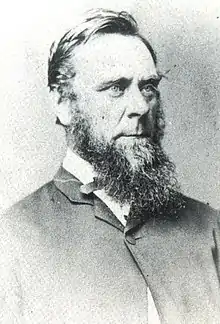| |||||||||||||||||||
All 86 seats in the Victorian Legislative Assembly | |||||||||||||||||||
|---|---|---|---|---|---|---|---|---|---|---|---|---|---|---|---|---|---|---|---|
| |||||||||||||||||||
| |||||||||||||||||||
The 1877 Victorian colonial election was held on 11 May 1877 to elect the 9th Parliament of Victoria. It was the first election in Victoria in which all electorates voted on the same day. All 86 seats in 55 electorates in the Legislative Assembly were up for election, though four seats were uncontested.[1]
There were 31 single-member, 20 two-member and 5 three-member electorates.[1][2]
The conservative (or free trade) government of Sir James McCulloch was heavily defeated by the liberal (or protectionist) opposition led by Graham Berry, who formed a new government on May 21.[1][3]
Results
| Party | Votes | % | Swing | Seats | Change | ||
|---|---|---|---|---|---|---|---|
| Liberal (Protectionist) | 93,557 | 51.46 | 56 | ||||
| Conservative (Free Trade) | 43,168 | 23.75 | 14 | ||||
| Independent | 41,295 | 22.72 | 15 | ||||
| Doubtful | 3,771 | 2.07 | 1 | ||||
| Totals | 181,791 | 86 | |||||
Aftermath
After McCulloch's crushing defeat he retired from politics without returning to parliament. He resigned from the seat of Warrnambool in May 1878.[4] After McCulloch's retirement, James Service emerged as the leader of the numerically depleted Opposition. Service's politics were more of a pragmatic and constitutionalist nature.[5]
This term of government was dominated by Berry's struggle with the Legislative Council after that body rejected an appropriations bill in December 1877. On 8 January 1878 ('Black Wednesday') Berry responded by dismissing large numbers of public servants and judges in an effort to discredit the council.[1] A compromise was reached in April, which left the council's powers intact. Berry left for Britain in December 1878 in an effort to persuade the Colonial Office to reform the Legislative Council. However, his efforts at constitutional reform were inconclusive and he returned to Melbourne after six months to face divisions in his party as well as a general economic depression (dubbed the 'Berry Blight') for which his opponents held him responsible.[6][7]
See also
References
- 1 2 3 4 5 "The Ninth Parliament Elected 11 May 1877". Psephos: Adam Carr's Electoral Archive.
- ↑ The General Election: The Nominations, The Argus (Melbourne), 5 May 1877, page 7.
- ↑ The Result of the Battle, Ovens and Murray Advertiser (Beechworth), 15 May 1877, page 2.
- ↑ Geoffrey Bartlett (1974), Sir James McCulloch (1819–1893), Australian Dictionary of Biography website, National Centre of Biography, Australian National University; accessed 10 December 2023.
- ↑ Geoffrey Serle (1976), James Service (1823–1899), Australian Dictionary of Biography website, National Centre of Biography, Australian National University; accessed 11 December 2023.
- ↑ Geoffrey Bartlett (1969), Sir Graham Berry (1822–1904), Australian Dictionary of Biography website, National Centre of Biography, Australian National University; accessed 10 December 2023.
- ↑ History of the Berry Ministry, The Argus (Melbourne), 12 February 1880, page 9.

